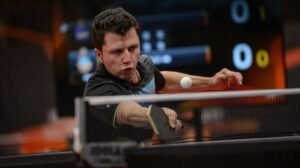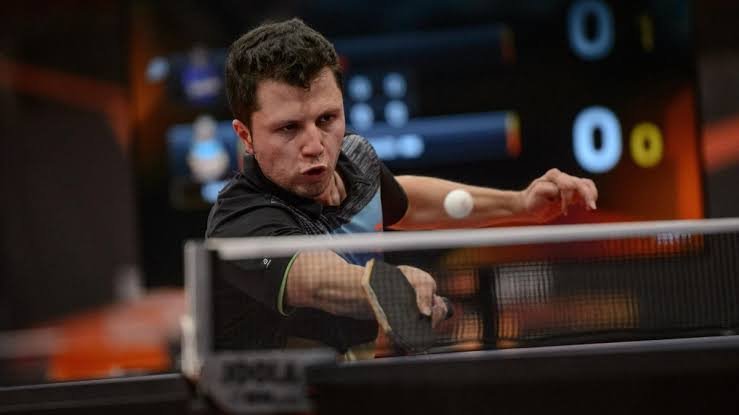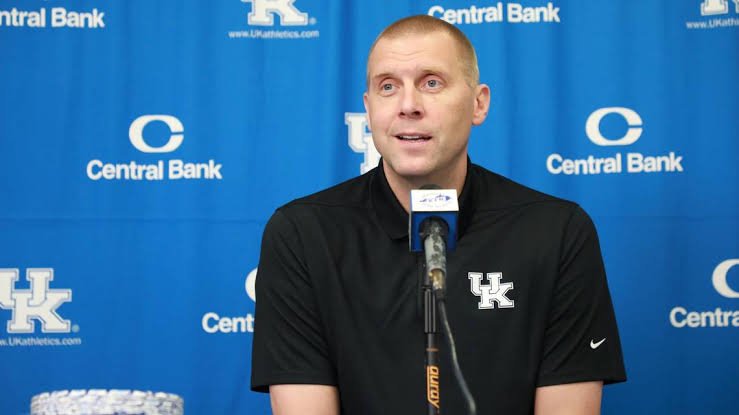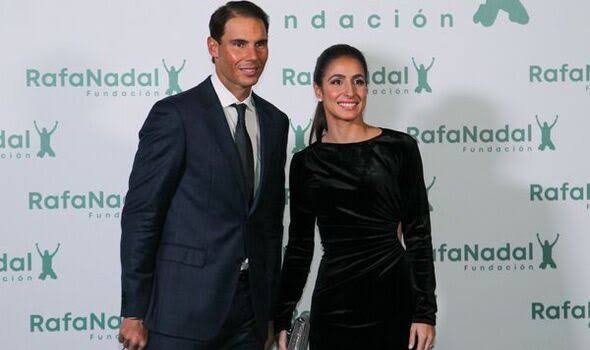MAHDI AHMADIAN ON OLYMPIC DREAMS…..
Mahdi Ahmadian, a table tennis player who hopes to make history by being the first refugee to compete in the sport at the Olympics, speaks with us in the most recent episode of Refugees’ Voice. He talks about his risky journey from Iran across Europe and how he is training like a “Iron Man” to try and realize his goal of competing in the 2024 Summer Olympics in Paris.

Mahdi Ahmadian’s father, an elite table tennis player from Iran, inspired him to pursue the game. Mahdi competed internationally, following in his footsteps, but he was forced to leave Iran due to a situation that made him fear for his safety.
After a treacherous journey across Europe, Mahdi arrived at a camp for refugees in Austria three weeks later, carrying nothing but a table tennis racket. But in order to maintain his long-held dream of becoming an Olympian, he created a whole new life for himself with the help of the people in his immediate vicinity and his unwavering love for the sport.
That same dream is now within reach, eight years after he fled Iran, thanks to a scholarship from the Olympic Refuge Foundation that will aid Mahdi in his preparation for Paris 2024. He will be the first refugee to compete in table tennis at the Olympics if he makes it to the Games.
At the age of eight, my father gave me my very first table tennis bat. Despite not having a table in our home, we played ball everywhere! We got our first table outside in our parking area three years later. My younger brother and I started playing together, and eventually he joined me in the gym. I always encourage him, and he’s had a great career since. My father used to travel a lot to take us to competitions, and my mother would always get really excited when we returned with medals. My parents are also proud of the two of us. Many of our friends were adversely affected by the political unrest in Iran, which prevented them from pursuing careers.
I participated in my first competition at my school before moving to Tehran to play for a team. I participated in and won a bronze in my first international tournament when I was seventeen. I was in Iran’s top 10 for under-21s by the age of 18. However, at the age of 19, I realized that I had to leave for my life and my athletic career because of a circumstance that prevented me from competing for the national team.
I had a really tough trip because I didn’t have my passport.I had to travel to Turkey first. I had to jump like a monkey to cross the border and traveled for up to 12 hours every day without food or drink. Later, someone made arrangements for me to be picked up by car and brought to a small house where I was joined by about fifty other refugees from Iraq and Afghanistan. I had to pretend I was an actor in a movie because the house was occupied by some very dangerous people who claimed they were trying to recruit people into a terrorist organization. I made an effort to appear dangerous by being amiable with them, engaging in poker games, and smoking cigarettes.
Before I was picked up by another car to travel to Istanbul, I spent three days there. I made arrangements for a ride to the border from Istanbul so I could take a boat to Greece. I was aware that refugees were welcomed in Europe even though it wasn’t official or lawful. There were almost fifty of us on a tiny plastic boat with a toy-like motor. We were all extremely cold because it was nighttime, everything was dark, and it was October.
After an hour or so, the motor began to malfunction, letting a lot of water into the boat. Everyone began to pray, and we all believed that we might pass away. It was a very difficult time, and I don’t want to think back on it too much. If I had to, I would swim to Greece, I just closed my eyes! We still had four hours to go, and the sea was extremely dangerous. They instructed us to dump everything into the water to lighten the boat’s weight. I threw out everything, including my food and travel bag, leaving only my table tennis bat! “This is the one thing I have that can help me,” I uttered.
We managed to reach Greece at the same time that they managed to fix the motor. I realized how fortunate I am when I realized how many others had perished before taking the same route after we arrived.
UN volunteers were aiding refugees in Greece, and I began to assist as well by translating between Farsi and English. Despite the fact that my English is awful, it was sufficient to assist hundreds of elderly and young people with their issues. It was a very trying experience, and I hope to never find myself in that predicament again. I witnessed all aspects of refugees’ lives, including how many of them were in poor health and how depressed some of them were.
Four days later, we rode a train across central Europe to Austria, where I was placed in a reception center—a place where refugees go when they first arrive in a new nation. Based in a renovated church in Linz, it was administered by nuns from the international charity Caritas*. I worked there as a cook and cleaner, and they were very kind and helpful. They asked what clothes I needed when I first arrived, but I was just depressed because all I wanted was to play table tennis! They discovered Linz AG Froschberg, one of the top table tennis academies in Europe, after two days. When I initially arrived at the club, the manager looked up my global ranking and inquired about.
To get to the club each time, I had to cycle and get a train, but I only had €140 per month so I had no chance to buy food. But at the church, apples were free, so I ate three apples a day – that was my life! Occasionally, I would get a hamburger for €1 at McDonald’s.
I had a health issue a month later, and people discovered me on the church floor. After taking me to the hospital, they declared that my condition was emotional rather than medical. Given the trauma they have experienced, I am aware that many refugees experience depression and panic attacks; perhaps this is what happened to me. But I was fine after that. I continued to train at the club and work at the church until I was offered a chance to compete in a tournament in Vienna. I moved to start a new life after meeting an Iranian player who played for a team called Baden AC. He told me I could play for the Austrian Bundesliga.
I’ve spent the last seven years in Baden. Not long after the move, an incredible thing occurred… I saw a woman at the metro station who I assumed to be Iranian. I approached her and asked if I could help because she seemed lost. When we eventually boarded the same train, I learned that she was a German teacher who had only arrived seven days prior. She was my teacher at first, and then it just happened! 2019 saw us move in together and get married. Our two children are now two and five years old, respectively; the daughter just began table tennis last month.
I was coaching at the club for work, but I had to support my family because everything in Austria is very expensive. I therefore started a table tennis racket sales company four years ago. After selling them at the club, I began selling them online to Iran, and it was a huge success.
I had three main areas of focus in my life: my business, my family, and my Bundesliga career. I received word earlier this year that I had been approved for the Refugee Athlete Scholarship. Given everything I had endured in this life, I found that to be a very moving moment. I simply collapsed and cried, “Thank you, God! My dream was that.
I used to jot down my dreams for the future while I was traveling from Iran and lodging in camps for refugees. I would write things like, “I want to own a business,” or “I want to compete in the Olympics.” I wrote roughly fifty things, and all of them are beginning to materialize! It demonstrates that anything is possible if you set your mind to it and work hard to achieve it.
I am also very appreciative of the Austrian people, who have given me a lot of support and excellent life opportunities. Never give up and never lose hope because, in my opinion, there is always someone who can hold your hand and guide you toward your goals.
As a refugee, you must begin your life afresh, just like a newborn. Speaking and forming relationships are two things you must learn because everything is new and different. I’ve been given the chance to start over, so I’m motivated to do my absolute best because of this. Similar to how my father was for me, I want to set a good example for my children.
I’m training like Iron Man for Paris! I strive to improve all aspects of my life, including my diet, exercise, and sleep, and I train twice a day. I play in international competitions roughly once a month as a member of the World Table Tennis Tour (WTT), and the ITTF (International Table Tennis Federation) has been a huge help to me. That implies that I can raise my ranking and gain experience playing with various players. Since I’m the first refugee to play table tennis, everyone is watching me play; it feels incredible to be looked upon like a superstar! Because I haven’t been able to play internationally for a long time, the competition is tough, but I feel confident that I can.
In the run-up to Paris 2024, Refugees’ Voice highlights recipients of the Refugee Athlete Scholarship. The Olympic Refuge Foundation oversees the Refugee Athlete Support Program, which is funded by Olympic Solidarity and has 63 scholarship recipients as of right now. The 63 athletes want to be a part of the IOC Refugee Olympic Team Paris 2024 and hope to make it to the Games. The athletes, who reside in 23 host nations and represent 13 sports, are nationals of 12 different nations.
Follow @mahdiahmadian_official to follow Mahdi on his journey, and @refugeeolympicteam to get updates on all the scholarship recipients.Caritas is a global network of 162 national Catholic organizations dedicated to development and relief.




Post Comment